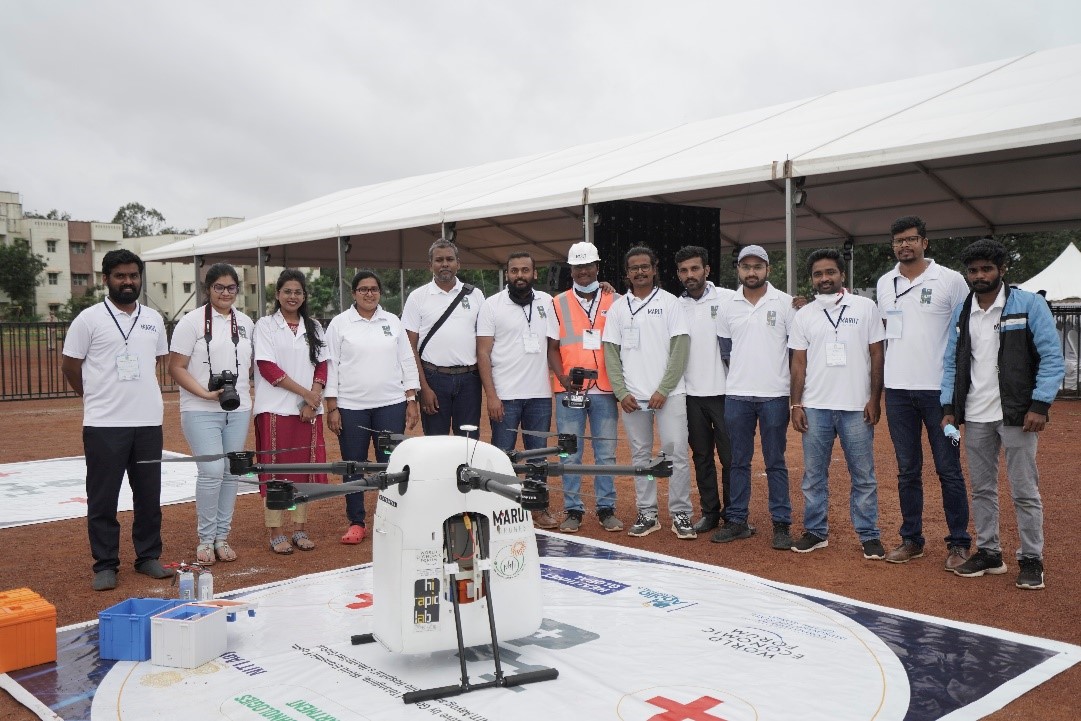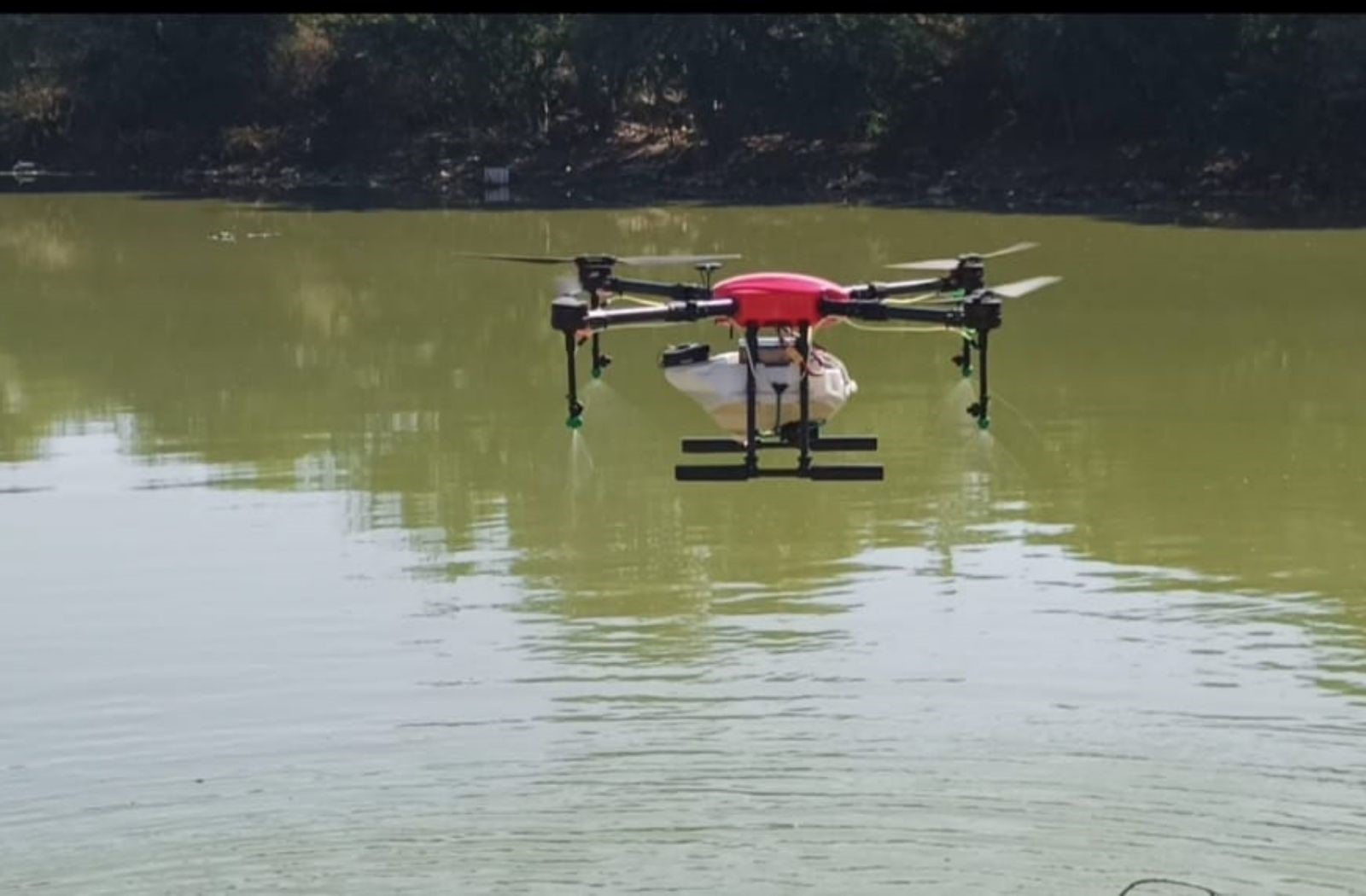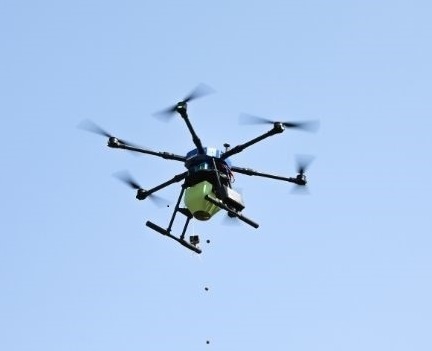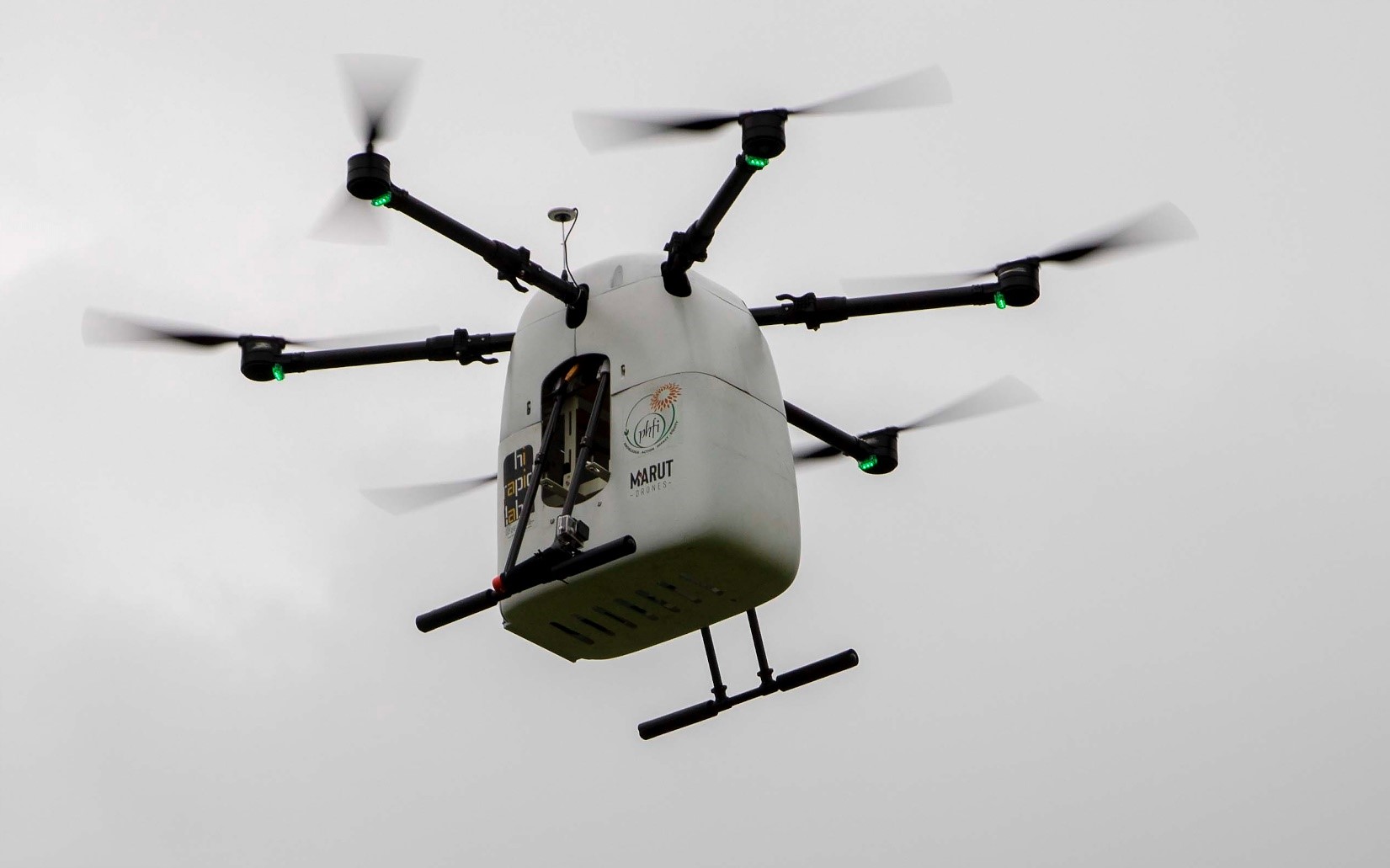
- A+
- A
- A-
When Sky is not the Limit: Meet Marut Drones, a Startup in the Drone Sector Making India Greener and Healthier
Five years ago, Prem Kumar and his batchmates from IIT Guwahati, Sai Kumar and Suraj Peddi, started their company, Marut Drones, which had but one mission: solve what has thus far seemed unsolvable. “We see problems around us every day, from diseases like malaria and dengue to the lack of healthcare access in deep, rural areas. And we thought, we have drone technology now; why can’t we find their solutions?” says founder and innovator Prem Kumar. From planting forests to delivering medicines, Kumar’s startup Marut Drones is pioneering technology in the drone space in India and providing solutions for many of the environmental and social problems affecting us today.

The Marut Drones team with one of their key innovations, the Hepicopter.
Image credit: Marut Drones
How the fire to solve a 70-year-old problem led to creation of Marut Drones
The journey towards building Marut Drones began in 2017, when Kumar wanted a solution to the swarms of mosquitoes breeding in the water body near his parents’ house. “The approach back then was to ask people to wade into the water to apply larvicides. This was difficult and inefficient, and the municipality seemed reluctant to undertake this activity when we wrote to them. So, one day, the idea struck us: Can’t we use a drone to do this,” Kumar recollects. The team did not register as a company right away. Instead, they started working on the drone that would become one of Marut’s strongest offerings—the Marut Zap.

The Marut Zap spraying a water body.
Image credit: Marut Drones
One of the biggest challenges the team faced was that they were all engineers and needed subject-matter experts to collaborate with. This is where the Research and Innovation Circle of Hyderabad (RICH) came in. RICH is the nodal organization of Hyderabad city’s S&T cluster. The team spoke with Ajit Rangnekar, the Director General of RICH, who put them in touch with CSIR’s Indian Institute of Chemical Technology (IICT) as well as experts in public health and entomology. “RICH has supported our journey since the very beginning, even before we were a company,” says Kumar. “When everyone else was telling us we should give it up because our goal is impossible to achieve, RICH had the vision to believe in us and encouraged us to move forward. Without them, it would have been much more difficult for us to make it this far,” he added.
After understanding the science behind the issue, the team developed a drone capable of spraying larvicides, equipped with an Internet-of-Things (IoT) device that can identify the population, species, and other information on mosquito populations. “Next, we thought of how we can scale this solution. Starting our own company seemed the obvious step,” says Kumar. Today, Marut Zap, India’s first mosquito eradication drone, has already covered over 1 lakh acres around 150 lakes and impacted more than one million lives.
Planting one billion trees by 2030
One another interesting project at Marut Drones is the Seedcopter. This drone has already planted over 50 lakh trees in 30+ districts in the past year across Telangana and Arunachal Pradesh (Read here). “ This year, we are aiming to target deforested areas and areas prone to forest fires across seven states, which is going to impact 900 forests and empower 1400 districts,” says Kumar.

The Seedcopter dispersing seeds.
Image credit: Marut Drones
As part of their afforestation initiative, the team at Marut Drones works with the State Forest Departments and the Principal Conservation Officer to draw up a list of areas that are most in need of afforestation. Local tribal groups and self-help groups prepare seed balls that are then dispersed by the Seedcopter drone. “We have roped in many pre-eminent environmentalists and Padmashri winners like Jadav Payeng (Forest Man of India), Daripalli Ramaiah, and Saalumarada Thimakka. We are all part of the largest afforestation campaign in the country, Hara Bahara, which aims to plant 1 billion trees by 2030.”
Watch Seedcopter’s Hara Bahara’s mission here.
Bringing healthcare to rural India
Another problem that Kumar is working on at Marut Drones is the lack of access to healthcare in the deep, rural pockets of India. To find a solution to this issue, the team had to expand the types of drones they manufactured to include ‘beyond the visual line-of-sight’ drones, BVLOS in short, which can travel long distances. BVLOS drones are much talked about in the drone space and will play a major role in the next era in drone technology. “We started BVLOS drone operations in Vikarabad for medicine and vaccine delivery, in collaboration with the World Economic Forum, and with RICH as our consortium partner in Telangana,” explains Kumar. These drones played a crucial role during the COVID-19 pandemic, for delivering both vaccines and medicines against the disease, by safely transporting about 5000 doses of vaccines at 2–8°C in one trip. So far, the drone, Hepicopter, has made over 1000 deliveries across four states.

The Hepicopter in flight, carrying medicines, diagnostic kits, and vaccines.
Image credit: Marut Drones
Kumar is optimistic, enthusiastic, and excited about how the drone industry will evolve in the future. “The drone industry, right now, is like the internet was in the 1990s. Nobody back then could imagine that the internet would become so deeply entangled with our daily lives. I believe the drone industry will grow in the same way.” When asked if he has advice for budding entrepreneurs, Kumar is firm, “It is time for us all to get down to solving our societal problems. Money is merely a by-product of doing good. Let’s set a great example to the world on how we can solve problems through technology.”
Aarti Kumar is a writer, conceptualiser, and creative machine, who is currently devoted to making science more accessible to everyday audiences.




